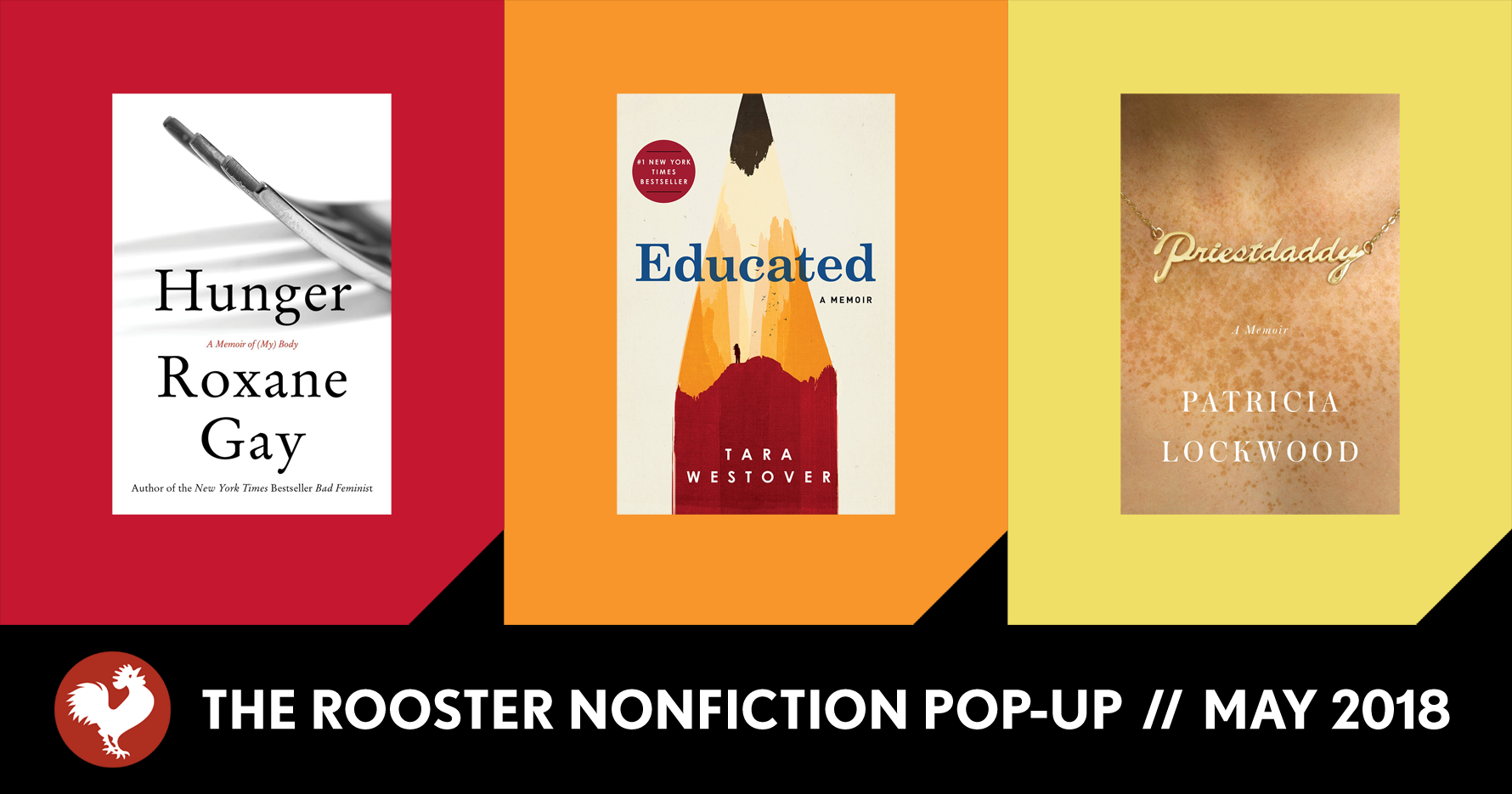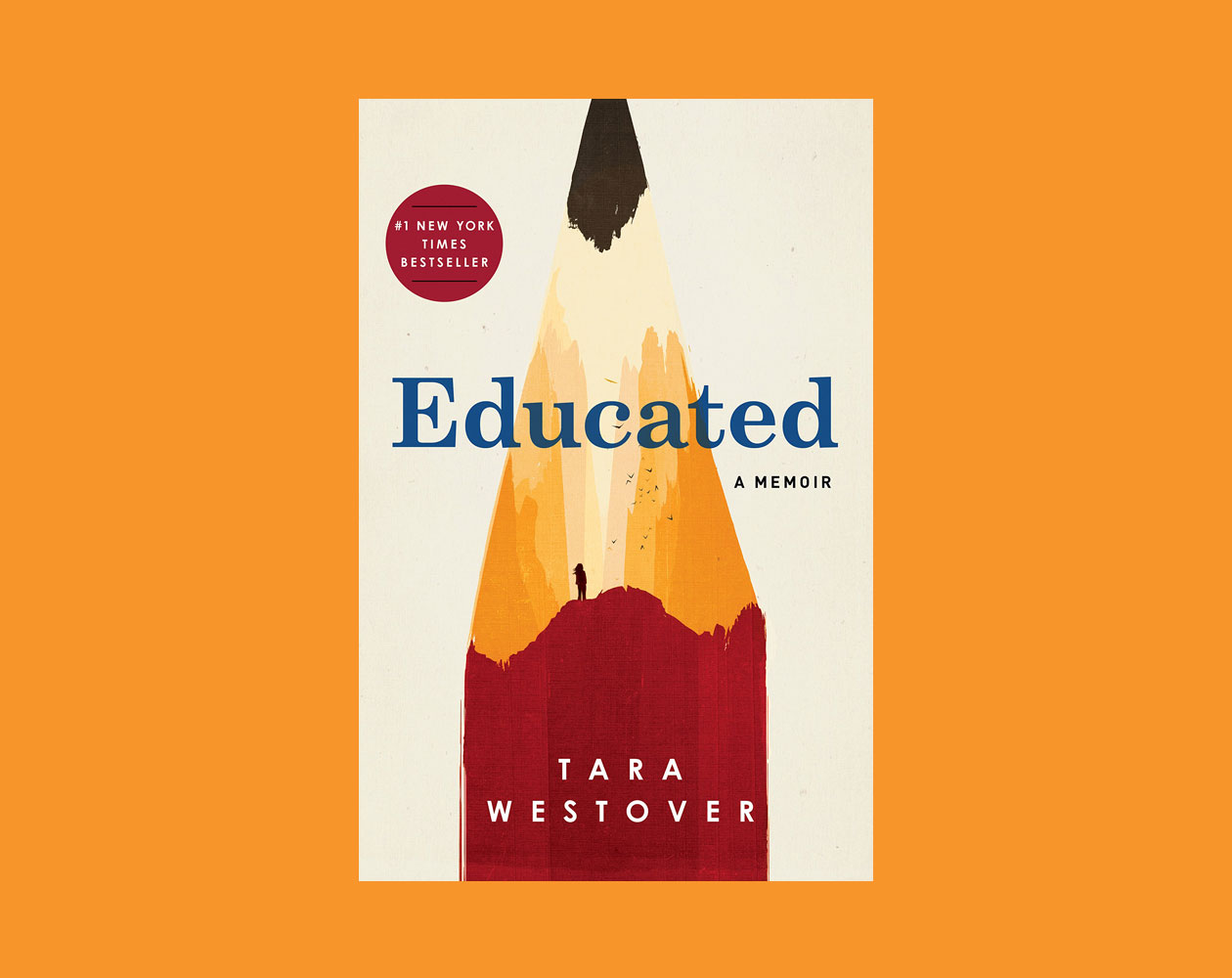Welcome to our first-ever Rooster Nonfiction Pop-up, brought to you by the organizers of the Tournament of Books.
All month long we’ll be discussing three recent works of nonfiction. To choose which books we’re reading this month, we asked this year’s ToB readers for suggestions back in March. We narrowed that list down to a single genre—memoir—and our readers voted to decide which three books we’d read for this event, and here they are: Hunger by Roxane Gay, Educated by Tara Westover, and Priestdaddy by Patricia Lockwood. You can see the full list of nonfiction contenders here.
Unlike the Tournament of Books and the Rooster Summer Reading Challenge, the Rooster Nonfiction Pop-up isn’t a competition—only a discussion about these three memoirs. Every Tuesday and Friday in May we’ll meet up to talk, and we’ll be teaming up with Sarah Hepola, author of the New York Times bestselling memoir Blackout: Remembering the Things I Drank to Forget. Grab some books and join in the fun!
- See the May 2018 nonfiction reading schedule
- Catch up on previous chats: Hunger (first half) (second half)
- Jump into today’s discussion in the comments
Please note: We receive a cut from purchases made through the book links in this article.
Rosecrans Baldwin: Sarah, can we just start the conversation by saying the story in this book is insane? Insane?
Sarah Hepola: It’s wild. In the margins I kept writing “WOW.” One of the complaints lobbed at memoir writers is: What’s so special about your story? That’s not a problem for Tara Westover. Her life is very, very unusual.
Rosecrans: For anyone who’s playing along, here’s the book in one sentence: A young woman, one of seven kids in a Mormon survivalist family in rural southeastern Idaho, survives a childhood of no schooling and near-constant physical threat—not to mention a crackpot father doing his best to keep her ignorant—by basically teaching herself enough math to get into college and then obtain a PhD in history from Cambridge by her late twenties, despite not knowing, for example, what the Holocaust was until she got to university. Sarah, what are some things that stood out for you that I’m not highlighting?
Sarah: I guess I’d like to point out that although the narrative is very dramatic, the tone is pretty subdued. We enter this world through the eyes of a little girl who doesn’t consider it strange that her midwife mother offers her skullcap and lobelia when she’s in pain, or that her dad makes her spend days in a scrap heap sorting metal. Like the rest of us, she didn’t choose her family, and it will be a long time before she questions her education there, so the childhood scenes are rendered in a straightforward way, even when they’re highly disturbing. This isn’t one of those “wacky” memoirs like Running With Scissors by Augusten Burroughs, where family antics are played for laughs. The book was a bit of a slow burn for me, actually, although I liked it very much.
The most exhilarating part of the memoir for me was when she got to college, and started to wake up to the wider world—
Rosecrans: Wait, we’re supposed to save that for our next discussion! Have you been reading ahead?
Sarah: Oh, whoops. See, this is what happens when you can’t put down a book. But as you mention, she’s never heard of the Holocaust. When people talk about Martin Luther King, Jr., she thinks they mean Martin Luther. My heart went out to her; I felt like a fraud at college, too, but nothing like what she was dealing with. She spent 16 years locked in this isolated world, and now she’s plunged into normalcy, and she’s freaking out. Things the rest of us take for granted are threatening to her: A miniskirt, aspirin, a roommate who drinks Diet Coke. I loved this inversion of expectations. I admire any book that can remind me how vastly different our perspectives, and yet underneath, how similar the emotions.
Rosecrans: I have a feeling we’ll talk about this later, but sometimes I found it strange how easily I was able to relate to the narrator’s experiences in college, or even on the mountain—as if there were a memoir-by-numbers quality to the writing? I’m not sure I know what I mean by that.
How about let’s discuss the violence. From her father iron-chucking to the terror machine that is her brother Shawn. I mean, we could talk about the role of third-degree burns for a couple hours and not run out of things to say. Did you ever have moments where you felt like you needed to look away? I know I did, and yet the violence is what I remember best when I set the book down, even more than her journey. How about you?
“Educated is an account of the struggle for self-invention. It is a tale of fierce family loyalty, and of the grief that comes from severing one’s closest ties. With the acute insight that distinguishes all great writers, Westover has crafted a universal coming-of-age story that gets to the heart of what an education is and what it offers: the perspective to see one’s life through new eyes, and the will to change it.” (Amazon / IndieBound / Powell’s)
Book description excerpted from publisher’s summary and edited for length.
Sarah: I kept thinking about how we live in a culture of anxious over-parenting, where kids are so protected that playgrounds are disappearing and children rarely bike around neighborhoods alone, and this book was like a fear manual for all that can go wrong if adults don’t pay attention. Characters get set on fire, fall from great heights, drive into ditches. By the way, many of the injuries get treated with skullcap and lobelia. You want to reach through the pages: Ditch the skullcap, and get some morphine!
Rosecrans: Is Skullcap & Lobelia the name of our new speed-metal-folk duo?
Sarah: Totally. Pitchfork will love our album, Tincture of Calendula.
Rosecrans: I know every time I put this book down I’m thankful for the role of modern pediatrics in my childhood.
Sarah: The violence was certainly vivid, but I thought it was essential to painting the world. I mean, we watch people get impaled and beheaded on Game of Thrones, but we have no on-the-ground experience with actual violence, the peeling flesh and bone breaks, so I appreciated this book for that eye-popping perspective. Although this is a contemporary memoir, the family lives more like people in the 19th century, which offers a pretty stunning window into what that life would have been like. (Answer: Very, very hard.) I’ve been on an Old West kick for the past couple years, and pioneer times are so brutal. The Donner Party! We mythologize that time period, but it’s utterly bleak. Of course this family’s situation is made harder by a father who, the author suggests, probably has bipolar disorder, though he’s never diagnosed.
I was reminded of the Mikal Gilmore memoir Shot in the Heart, about his older brother Gary Gilmore, who was convicted of murder and executed by firing squad. That book talks about the violent history of the Mormon faith, something I also got from Jon Krakauer’s Under the Banner of Heaven. I was actually hoping to hear more about Mormonism in this memoir, but Westover refrains from editorializing much, aside from critiquing the role of women and plural marriage. The book opens with a note explicitly telling us this not about Mormonism or religious belief: “In it there are many types of people, some believers, some not; some kind, some not. The author disputes any correlation, positive or negative, between the two.” I respect that note.
Rosecrans: To stay on all the violence—the car accidents, the burns, Shawn’s attacks, the impalings in the junkyard—one reason it got to me was because of how simply it was written. “On the last turn, the bucket swung with such force that a spike of iron was flung toward me. It pierced the inside of my leg, an inch below my knee, sliding into the tissue like a knife into warm butter.” Putting aside the butter cliché, I’ve gotta say, for a book dealing in so many extremes, the violence was transcribed so plainly, so nearly dully, it made me believe Westover’s account even more.
Sarah: The plain-ness of the language struck me, too. That’s when I realized: Oh, she doesn’t think this is weird. I appreciated the clarity of her descriptions, because I do think I might have struggled to stay in the story if it had been, shall we say, pushing for results. And that would be a really easy thing to do. I mentioned to Andrew in our Hunger conversations that I have a problem with eccentric characters. I tend to recoil a bit, or mistrust the storytelling. I never struggled to believe her father. He seemed completely real to me. And her mother, who is split between the role of dutiful wife and mother protector.
By the way, what did you make of Shawn? We’re led to believe her father has mental illness, but what is wrong with Shawn? He reminded me of a few creepy boyfriends I’ve seen friends date over the years: this horrible lashing out, only to come back and apologize. That awful mix of charm and menace.
Rosecrans: Shawn scared me out for the exact reasons you mention—because he was so plausible, so back-and-forth, so broadly depicted. The swings between brutality and apology. The confrontations with their father. For anyone following along who hasn’t started the book, Shawn daringly saves his sister’s life during a high-speed horse chase, and then also likes to drag her around by the hair and smash her head into a toilet (and do much worse things).
I’ll admit that as the story unfolded, I struggled at times to take it all in or stick to the story. Westover’s narration is lucid and very evenly balanced, and her footnotes—to accommodate other siblings’ recollections of events, albeit the siblings who agreed to cooperate with this book—aim to convince us everything’s as true as possible. (And plenty is verifiable: Her family does have an essential oil business. She did go to BYU and won a Gates Scholarship to Cambridge.) But there is also a blaséness that sneaks into the story sometimes. Maybe this is what I meant earlier when I was talking about the memoir-by-numbers: a sense of the ship being too evenly balanced, too impersonally steered. Did you struggle to buy in or believe the narrator?
Sarah: I never struggled to believe her. She reads true to me, whatever that means. (And I honestly don’t know what it means, but it’s a gut feeling I get.) But I did have lingering, back-of-the-mind questions about the rules she was creating for her narrative, because they seemed to shift. The childhood chapters are rendered through long passages of dialogue and evocative detail. But toward the end of the book, we get a footnote on a few text messages and emails, informing us they’ve been paraphrased. To be fair—isn’t most of this book paraphrased? Are the footnotes necessary on those digital exchanges because a written account exists? Is she trying to winkingly convey that those characters can’t spell or type, or is she trying to avoid a lawsuit? I was confused. On one hand, I like knowing an author is grappling with her own account, interrogating her assumptions and confirmation bias. Sending pages to family members is something recommended by Mary Karr in The Art of Memoir and Beth Kephart in Handling the Truth, my two favorite how-to books on memoir. At the same time, the footnotes felt a little unintegrated to me.
All of this brings up hard-to-answer questions about the ethics of memoir. Do we want art, or do we want accuracy? Memoir writers say “this is true,” but whose truth? These are tricky questions. I worry about them all the time. I know I sometimes get them wrong, and so on the off-chance that Tara Westover is reading this, I hope she understands that I have dwelt in this cave, sister. I haven’t found the perfect balance either.
Rosecrans: One last question for today, then we’ll turn it over to the commentariat. Did the narrator’s escape from the mountain feel inevitable to you as you were reading? I mean, the jacket copy makes it clear that Westover leaves and gets educated, becomes successful, but I’ll admit there were plenty of times when I feared she wouldn’t—and those were some of the most gripping moments for me, and I didn’t feel like they were manufactured for the sake of narrative. How about you? In fact, as a memoir author, do you ever feel compelled to inflate certain moments in a story, to make them stand out as pivots or dramatic turns for the reader, to give the story a more pronounced shape?
Sarah: It was clear to me that she’d make it out, but like any compelling narrative, I’m reading to figure out how. I want to know what her relationship with the family will look like in the end—if she can bridge both worlds, or if losing them will be the price of escape.
I try not to inflate certain moments in my writing, because when I do, they end up reading false to me. But I do think the act of selecting details and creating a narrative arc can’t help but give those moments way more import than they ever had in real life. The morning in June 2010 when I woke up from a blackout certainly didn’t seem special. It was depressing; I felt stuck. But that turns out to be the day I got sober, so the event becomes quite dramatic when you read my book. At the time, it was just another crappy Sunday. Nobody ever thinks, “Oh, I just did the thing that will end part one.”
Rosecrans: Well, that ends our conversation for today. Readers, I’ll see you in the comments for your thoughts and reactions, then join us back here on Tuesday when we finish the rest of the book. Have a great weekend, everybody.




